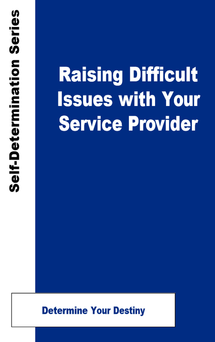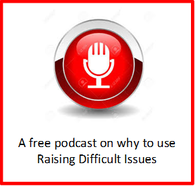About the workbookRaising Difficult Issues with Your Service Provider is a workbook designed to help people bring up sensitive issues with their behavioral health clinicians. It is based on the principle that good service providers value feedback from people who use their services, and often welcome constructive comments and suggestions. The workbook helps people plan how to introduce difficult subjects in a non-threatening manner so that service providers are able to listen and act in partnership with service users.
Many people have experienced wanting to raise a sensitive topic with a service provider, such as when they are displeased with their treatment or the way that it is progressing. But it can be hard to challenge someone who is trying to help, or who holds more of the power in the relationship. It can be difficult to tell a case manager or psychiatrist that you don’t like the way your treatment is going or that you’d rather work in a different way or tackle a different goal. Yet, research shows that it is important for service recipients to express their viewpoints and honest opinions in treatment situations in order to obtain the best treatment outcomes. |
Who can use it? |
This workbook is for people who have been diagnosed with a behavioral health disorder and who are receiving mental health services. Other service users have found the workbook to be useful, including people receiving medical treatment for health conditions, and those receiving any type of social service. It is especially designed for people who use publicly-funded service systems where providers often feel rushed, over-burdened, and unsupported. Other users of the workbook include doctors and clinicians themselves, who find it useful in thinking about how to improve their own practices and ways of interacting with the people they serve.
|
How does it work? |
Raising Difficult Issues provides a set of suggested “conversation starters” or statements designed to introduce a need or concern to a behavioral health clinician. They are grouped into topical areas based on input from mental health service users, including refocusing on life goals such as education, employment, finances, or dating; respecting privacy; partnering rather than directing the treatment process; preferences about disclosing trauma and respecting boundaries; and being supportive in decision-making.
Each statement is written in a manner that clearly expresses the concern, places the speaker in control of his or her treatment, and opens up honest communication between service user and provider. Suggestions also are included regarding how to prepare for the conversation, how to carry it off successfully, and what to do if service providers resist or become defensive. |
What resources are needed? |
The 14-page workbook can be read online or downloaded and printed for use. It is written at a grade school reading level.
|
What experience is needed? |
No experience is needed to use the workbook.
|
Preparing to use the workbook |
Anyone can pick up and use Raising Difficult Issues to identify a concern or problem with a service provider, consider different ways to start the conversation, and then make a plan to hold the discussion at the next appointment. Helpful preparation tips include:
1. If using the workbook on your own, consider involving a friend or family member to support you in this process. 2. Focus on how you feel and not on how you think your service provider feels. 3. Plan to spend 10% of your effort on the problem and 90% on the solution. 4. Realize that it may take several meetings with the service provider to come to an agreement that is mutual. 5. Recognize that learning how to stand up for yourself is a process. You can practice starting these conversations with peers, friends, or family before raising them with a service provider. |
|
Podcast length: 6 minutes
|
A free webinar on Raising Difficult Issues with Your Provider (18 minutes)
|


